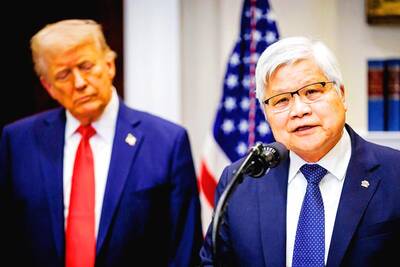A leadership reshuffle within China Life Insurance Co (
Previously controlled by Koo Chen-fu (
"With support from Jeffrey Koo's Chinatrust Commercial Bank (中國信託商銀), the insurer's stock price is likely to climb ...," former president of Wealth Magazine (財訊) Hsieh Chin-ho (謝金河) said yesterday, adding that the insurer's reassessment of assets also helped boost shareholder confidence.
The firm's stock price yesterday rose NT$0.45, or 6.4 percent, to NT$7.50. The insurer estimates it stock is worth NT$52.12, according to written statement release by the company.
The firm's board meeting on Wednesday accepted the resignations of two top officials, Koo Chen-fu and his son Chester Koo (辜啟允), who cited health concerns. It appointed Jeffrey Koo's son Koo Chung-li (辜仲立) and Yen Ho-yuan (顏和永) as its chairman and president respectively -- a move to strengthen Jeffrey Koo's grip on power.
The appointment of Koo Chung-li, 34 -- Jeffrey Koo's third oldest son -- represents his father's willingness to take over the insurer's problems after its former president Chester Koo took on debts of more than NT$50 billion, Hsieh said.
Moreover, the 74-year-old Yen, who was the insurer's vice chairman and vice president for more than four years, will assist the younger Koo with his 18 years of experience with the Koo Group (
Yen formerly served as chairman of Taiwan Fuji Xeros Corp (
Hsieh said that Jeffrey Koo, whose business in the financial sector is healthy and strong, is the only member of the Koo family -- one of Taiwan's richest families with business interests ranging from cement to communications -- who is capable of reviving the ailing insurer.
Since Jeffrey Koo has also placed his sons in key positions at Chinatrust and KGI Securities Co (中信證券), pundits said that the China Life reshuffle might signal plans to merge the insurer into a financial holding company that Chinatrust plans to set up -- speculation that the bank has denied.
"[The merger] is the main reason for the changes," said James Lin, who manages NT$ 1.2 billion (US $35 million) in stocks at Apollo Securities Investment Trust Co (阿波羅投信). "And from that perspective, it's positive for China Life."
Echoing Lin's view, Hsieh said that the leadership change at China Life showed that Koo Chen-fu planned to focus his business interests on the cement, cable television and communications sectors, while Jeffrey Koo would further expand his interests in the banking, securities and petrochemical industries.

ENDEAVOR MANTA: The ship is programmed to automatically return to its designated home port and would self-destruct if seized by another party The Endeavor Manta, Taiwan’s first military-specification uncrewed surface vehicle (USV) tailor-made to operate in the Taiwan Strait in a bid to bolster the nation’s asymmetric combat capabilities made its first appearance at Kaohsiung’s Singda Harbor yesterday. Taking inspiration from Ukraine’s navy, which is using USVs to force Russia’s Black Sea fleet to take shelter within its own ports, CSBC Taiwan (台灣國際造船) established a research and development unit on USVs last year, CSBC chairman Huang Cheng-hung (黃正弘) said. With the exception of the satellite guidance system and the outboard motors — which were purchased from foreign companies that were not affiliated with Chinese-funded

PERMIT REVOKED: The influencer at a news conference said the National Immigration Agency was infringing on human rights and persecuting Chinese spouses Chinese influencer “Yaya in Taiwan” (亞亞在台灣) yesterday evening voluntarily left Taiwan, despite saying yesterday morning that she had “no intention” of leaving after her residence permit was revoked over her comments on Taiwan being “unified” with China by military force. The Ministry of the Interior yesterday had said that it could forcibly deport the influencer at midnight, but was considering taking a more flexible approach and beginning procedures this morning. The influencer, whose given name is Liu Zhenya (劉振亞), departed on a 8:45pm flight from Taipei International Airport (Songshan airport) to Fuzhou, China. Liu held a news conference at the airport at 7pm,

KAOHSIUNG CEREMONY: The contract chipmaker is planning to build 5 fabs in the southern city to gradually expand its 2-nanometer chip capacity Taiwan Semiconductor Manufacturing Co (TSMC, 台積電), the world’s biggest contract chipmaker, yesterday confirmed that it plans to hold a ceremony on March 31 to unveil a capacity expansion plan for its most advanced 2-nanometer chips in Kaohsiung, demonstrating its commitment to further investment at home. The ceremony is to be hosted by TSMC cochief operating officer Y.P. Chyn (秦永沛). It did not disclose whether Premier Cho Jung-tai (卓榮泰) and high-ranking government officials would attend the ceremony. More details are to be released next week, it said. The chipmaker’s latest move came after its announcement earlier this month of an additional US$100 billion

Authorities yesterday elaborated on the rules governing Employment Gold Cards after a US cardholder was barred from entering Taiwan for six years after working without a permit during a 2023 visit. American YouTuber LeLe Farley was barred after already being approved for an Employment Gold Card, he said in a video published on his channel on Saturday. Farley, who has more than 420,000 subscribers on his YouTube channel, was approved for his Gold Card last month, but was told at a check-in counter at the Los Angeles International Airport that he could not enter Taiwan. That was because he previously participated in two